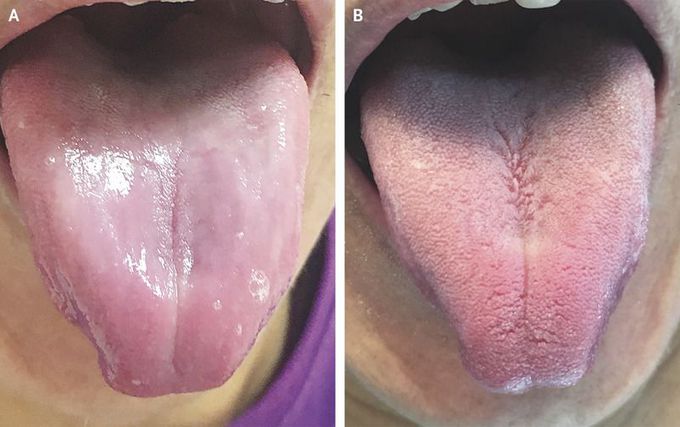


Atrophic Glossitis
A 64-year-old man presented to the oral medicine clinic with a painful, smooth, red tongue and a burning sensation around his lips that had developed 6 months earlier. Physical examination revealed an atrophic, erythematous tongue with loss of the lingual papillae (Panel A). No deficits were found on neurologic examination. Laboratory results revealed a hemoglobin level of 13.7 g per deciliter (normal range, 13.1 to 16.6) and a mean corpuscular volume of 101.5 fl (reference range, 83.0 to 95.5). The serum vitamin B12 level was less than 37 pmol per liter (50 pg per milliliter; reference range, 135 to 675 pmol per liter [180 to 910 pg per milliliter]). The serum folate level was normal. Test results for anti–intrinsic factor autoantibodies were positive, with a titer of 60 U per millimeter, and the titer for antigastric parietal-cell autoantibodies was 16 U per milliliter (both titers are considered negative at levels of <20 U per milliliter). A diagnosis of pernicious anemia was made. Treatment with weekly intramuscular injections of vitamin B12 was initiated. The patient’s oral symptoms abated after 2 weeks of treatment, and the atrophic glossitis had resolved by the time of follow-up at 1 month (Panel B). The patient’s vitamin B12 level increased, and he continues to receive monthly injections.
What about his stomach?,any findings like symptoms of gastritis?
What Are the Symptoms of Gastritis? Symptoms of gastritis vary among individuals, and in many people there are no symptoms. However, the most common symptoms include: 1. Nausea or recurrent upset stomach 2. Abdominal bloating 3.Abdominal pain 4.Vomiting 5.Indigestion 6.Burning or gnawing feeling in the stomach between meals or at night 7.Hiccups 8. Loss of appetite 9. Vomiting blood or coffee ground-like material 10. Black, tarry stools OK friend😷
Stomach Treatments The stomach is a muscular organ located on the left side of the upper abdomen. The stomach receives food from the esophagus. As food reaches the end of the esophagus, it enters the stomach through a muscular valve called the lower esophageal sphincter. The stomach secretes acid and enzymes that digest food. Ridges of muscle tissue called rugae line the stomach. The stomach muscles contract periodically, churning food to enhance digestion. The pyloric sphincter is a muscular valve that opens to allow food to pass from the stomach to the small intestine. Stomach Conditions Gastroesophageal reflux: Stomach contents, including acid, can travel backward up the esophagus. There may be no symptoms, or reflux may cause heartburn or coughing. Gastroesophageal reflux disease (GERD): When symptoms of reflux become bothersome or occur frequently, they’re called GERD. Infrequently, GERD can cause serious problems of the esophagus. Dyspepsia: Another name for stomach upset or indigestion. Dyspepsia may be caused by almost any benign or serious condition that affects the stomach. Gastric ulcer (stomach ulcer): An erosion in the lining of the stomach, often causing pain and/or bleeding. Gastric ulcers are most often caused by NSAIDs or H. pylori infection. Peptic ulcer disease: Doctors consider ulcers in either the stomach or the duodenum (the first part of the small intestine) peptic ulcer disease. Gastritis: Inflammation of the stomach, often causing nausea and/or pain. Gastritis can be caused by alcohol, certain medications, H. pylori infection, or other factors. Stomach cancer: Gastric cancer is an uncommon form of cancer in the U.S. Adenocarcinoma and lymphoma make up most of the cases of stomach cancer. Zollinger-Ellison syndrome (ZES): One or more tumors that secrete hormones that lead to increased acid production. Severe GERD and peptic ulcer disease result from this rare disorder. Gastric varices: In people with severe liver disease, veins in the stomach may swell and bulge under increased pressure. Called varices, these veins are at high risk for bleeding, although less so than esophageal varices are. Stomach bleeding: Gastritis, ulcers, or gastric cancers may bleed. Seeing blood or black material in vomit or stool is usually a medical emergency. Gastroparesis (delayed gastric emptying): Nerve damage from diabetes or other conditions may impair the stomach’s muscle contractions. Nausea and vomiting are the usual symptoms. Stomach Tests Upper endoscopy (esophagogastroduodenoscopy or EGD): A flexible tube with a camera on its end (endoscope) is inserted through the mouth. The endoscope allows examination of the esophagus, stomach, and duodenum (the first part of the small intestine). Computed tomography (CT scan): A CT scanner uses X-rays and a computer to create images of the stomach and abdomen. Magnetic resonance imaging: Using a magnetic field, a scanner creates high-resolution images of the stomach and abdomen. pH testing: Using a tube through the nose into the esophagus, acid levels in the esophagus can be monitored. This can help diagnose or change treatment for GERD. Barium swallow: After swallowing barium, X-ray films of the esophagus and stomach are taken. This can sometimes diagnose ulcers or other problems. Upper GI series: X-rays are taken of the esophagus, stomach, and upper part of the small intestine. Gastric emptying study: A test of how rapidly food passes through the stomach. The food is labeled with a chemical and viewed on a scanner. Stomach biopsy: During an endoscopy, a doctor can take a small piece of stomach tissue for tests. This can diagnose H. pylori infection, cancer, or other problems. H. pylori test : While most people with H. pylori infection don't develop ulcers, simple blood or stool tests can be done to check for infection in people with ulcers or to verify that the infection is wiped out after treatment. Stomach Treatments Histamine (H2) blockers: Histamine increases stomach acid secretion; blocking histamine can reduce acid production and GERD symptoms. Proton pump inhibitors: These medicines directly inhibit the acid pumps in the stomach. They must be taken daily to be effective. Antacids: These medicines can help against the effects of acid but don't kill bacteria or stop acid production. Endoscopy: During an upper endoscopy, tools on the endoscope can sometimes stop stomach bleeding, if present. Motility agents: Medicines can increase contraction of the stomach, improving symptoms of gastroparesis. Stomach surgery: Cases of severe stomach bleeding, ruptured ulcers, or cancer require surgery to be cured. Antibiotics: H. pylori infection can be cured with antibiotics, which are taken with other medicines to heal the stomach.


